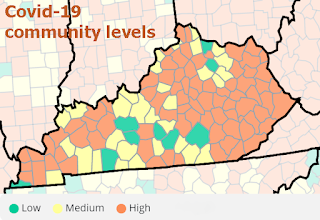9 counties drop to low risk of Covid-19, but 80 remain at high risk; Kentucky infection rate second highest among the states

CDC map, adapted by Kentucky Health News
—–
By Al Cross
Kentucky Health News
Kentucky’s risk from Covid-19 fell slightly last week, based on the county-by-county risk as estimated by the Centers for Disease Control and Prevention.
The state still had 80 of its 120 counties in the high-risk zone, indicated by orange on the CDC map released Thursday, but unlike last week, it has some counties at low risk. There are nine: Fulton, Logan, Edmonson, Grayson, Green, Adair, Pulaski, Nicholas and Bracken. Another 31 are at moderate risk.
In the 80 high-risk counties, state guidelines call for wearing masks in indoor public spaces, limiting in-person gatherings, limiting the size of gatherings, and social distancing. People in the 31 moderate-risk counties who are immunocompromised, or at high risk for severe illness from the virus, should talk to a health-care provider about whether they need to wear a mask or take other precautions, the CDC says.
The CDC provides other maps, including one that shows the level of coronavirus transmission. It shows every county has a high level except Carlisle and Lyon counties in West Kentucky, which are moderate. State officials say the risk map, which is based on new coronavirus cases, hospital admissions and hospital capacity, is the best guidance for preventive measures.
The improvement in the risk map reflected a slight decline in new cases last week, but Kentucky’s seven-day infection rate remains the second highest among the states, trailing only Alaska, according to The New York Times. It says Perry County has the highest rate in the U.S., not counting parts of Puerto Rico and the Northern Mariana Islands. Greenup and Letcher counties also rank very high nationally.
Beshear noted a dip last week in the percentage of Kentuckians testing positive for the coronavirus, to 17.89% from the previous week’s 19.11%, but said it takes more than one week to make a trend.
“If you are a vulnerable Kentuckian, with age or health conditions, you really need to be vaccinated,” he said. “So many people are getting it, that we are seeing more bad outcomes than with the last variant.”